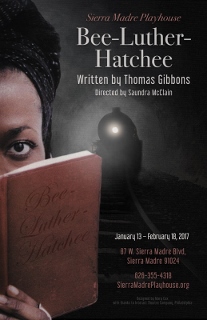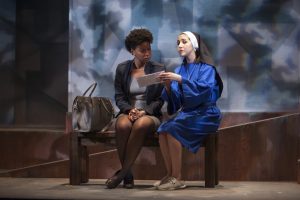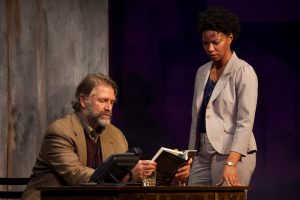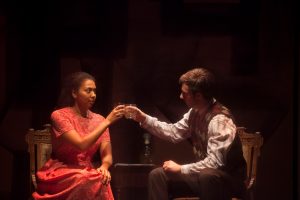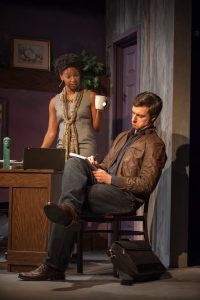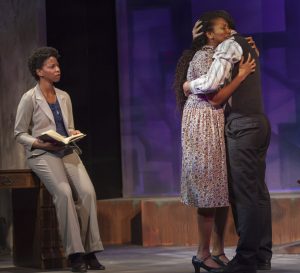WHEN IS FAKING IT OK?
If someone should recommend Sierra Madre Playhouse’s production of Bee-Luther-Hatchee to you, they’re not off the mark. My advice would be that you walk, don’t run, to see it. Two main issues keep this from being an impactful evening. One: This isn’t a great play; Act I is all set-up and Act II is all diatribe (albeit a fascinating debate). Although I love that so many great questions are asked, often in a compelling way; the best to chew on would be, “Who has the right to tell another person’s story?” The other issue is the issues; there’s a lot of them to cover and Thomas Gibbons’ 1999 play can feel overwritten.
Shelita Burns (Tamarra Graham), an African-American editor, publishes Bee-luther-hatchee, the autobiography of a reclusive 72-year-old black woman named Libby Price. Shelita has never met Libby, and when the book wins a prestigious award she decides to deliver it to her in person. To her profound shock, the actual author of the book is a white man named Sean Leonard (Christian Lebano). Furious and resentful, Shelita accuses Sean of perpetrating a hoax, while he defends the book as a truthful work of imagination.
What keeps all this from being just discussion is the continuing presence of Libby (Leilani Smith), whom we see behind a scrim, speaking in her own voice, telling and reenacting her own stories. As the authenticity of Libby’s voice becomes more complicated by the revelations of the play, so too her story becomes more germane to the issues being discussed by Shelita and Sean: how narratives get spoken and listened to; how listeners make storytellers immortal by retelling their stories; and, finally, how white men wish to atone for the sins their fathers have perpetrated on black women.
This last set of questions contains the other two mysteries of the play: What is Libby’s true relationship with the young white widower Robert (Jon Sprik) and his 9-year-old son with whom she lives? And then there’s the meaning and relevance of “Bee-Luther-Hatchee,” the one stop after hell on the train line of death, which gives Libby’s memoir and Gibbons’ play its title.
Sometimes, the conversational dialogue can be labored and contrived, leaving the actors here to go all over the map–from raw and powerful to lost and undefined–in search of the right tone, which is not made richer by Saundra McClain’s crowded, on-the-nose staging. It’s a mostly interesting evening but not nearly as compelling or riveting as the subject matter itself. I think patrons willing to look past a play that’s somewhat wordy and oddly structured will find there’s enough intelligence and mystery within this debate–told in a complex, eloquent way–to provoke a post-theater debate.
photos by Gina Long
 Bee-Luther-Hatchee
Bee-Luther-Hatchee
Sierra Madre Playhouse
87 W. Sierra Madre Blvd. in Sierra Madre
Fri and Sat at 8; Sun at 2:30
ends February 18, 2017
for tickets, call 626.355.4318
or visit Sierra Madre Playhouse
